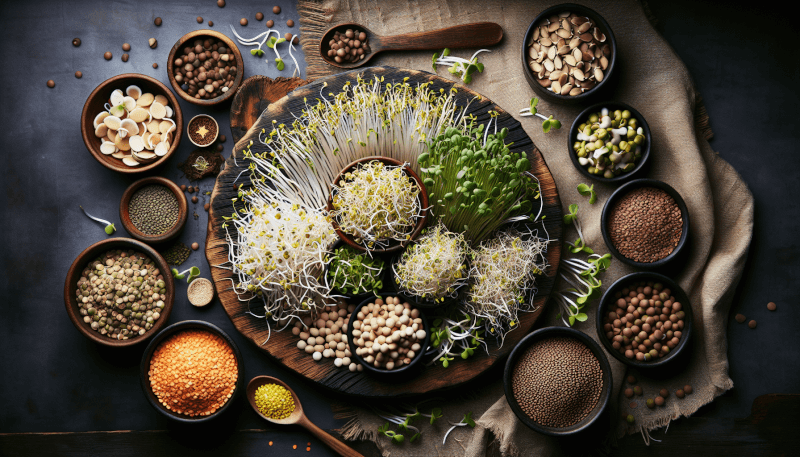👋 Click the mic button to talk to Alfred, the Todd's Seeds Gardening/Sprouting Expert – Feel free to ask him anything!
Ask Virtual Todd Anything - Click the Mic
Imagine a world where you have the power to grow your own delicious, fresh, and nutritious food right at home. With Sprouting Seeds Edible, this vision becomes a reality. Harnessing the incredible potential of sprouting seeds, this innovative company has created a solution that enables anyone, regardless of space or expertise, to cultivate their own edible sprouts. From crunchy alfalfa to robust lentils, these tiny powerhouses are packed with flavor and goodness. Join the sprouting revolution and unlock the potential of your own kitchen garden with Sprouting Seeds Edible.
What are sprouting seeds?
Sprouting seeds refer to seeds that have just begun to germinate and sprout. These seeds are typically consumed when they are still in the early stages of growth, typically within a week of sprouting. Sprouting seeds have gained popularity due to their numerous health benefits and versatile culinary uses. They are packed with essential nutrients and offer a delicious and crunchy texture to meals.
Definition
Sprouting seeds are simply seeds that have been soaked in water and allowed to germinate. During the sprouting process, enzymes are activated which break down complex compounds into simpler forms, making the nutrients more accessible and bioavailable. This early stage of growth is when the seeds offer the highest nutritional value and become edible.
Types of sprouting seeds
There is a wide variety of seeds that can be sprouted and consumed. Here are some popular types of sprouting seeds:
Alfalfa seeds: These tiny seeds are known for their mild and slightly nutty flavor. Alfalfa sprouts are commonly used in sandwiches, salads, and stir-fries.
Broccoli seeds: Broccoli sprouts are a rich source of sulforaphane, a powerful antioxidant. They have a slightly bitter flavor and are often enjoyed in salads and wraps.
Radish seeds: Radish sprouts have a spicy and peppery taste, adding a kick to your meals. They are great for sandwiches, tacos, and omelets.
Mung beans: Mung bean sprouts are commonly used in Asian cuisine. They have a crisp texture and are delicious in stir-fries, noodle dishes, and soups.
These are just a few examples, and the possibilities for sprouting seeds are endless. Experiment with different seeds to find your favorites!
Nutritional benefits of sprouting seeds
Sprouting seeds offer a wide range of nutritional benefits compared to their dormant counterparts. The sprouting process enhances the nutrient content and makes them easier to digest and absorb by your body.
Increased nutrient content
When seeds are sprouted, their nutrient content significantly increases. Sprouting triggers the release of various vitamins, minerals, and enzymes. For example, sprouted seeds are higher in vitamin C, vitamin K, iron, and fiber compared to unsprouted seeds. The increased nutrient density makes sprouting seeds a great addition to a healthy diet.
Improved digestibility
Sprouting seeds can help improve digestibility. The sprouting process breaks down complex carbohydrates, proteins, and fats into simpler forms, making them easier for your body to break down and absorb. This can be especially beneficial for individuals with digestive issues, as sprouting seeds can help alleviate bloating and discomfort.

Health benefits of consuming sprouting seeds
In addition to their nutritional value, consuming sprouting seeds has several health benefits. Incorporating sprouts into your diet can support overall wellbeing and promote a healthy immune system.
Boosted immune system
Sprouting seeds are packed with antioxidants and enzymes that can help strengthen your immune system. Antioxidants help neutralize damaging free radicals in the body, reducing inflammation and boosting overall immune function. By consuming sprouting seeds regularly, you can give your immune system the support it needs to ward off common illnesses and infections.
Improved cardiovascular health
Sprouting seeds, such as broccoli sprouts, are rich in compounds that promote cardiovascular health. Sulforaphane, found in broccoli sprouts, has been shown to reduce the risk of heart disease by improving blood vessel function and reducing inflammation. Regular consumption of sprouting seeds can help support a healthy heart and reduce the risk of cardiovascular diseases.
Reduced risk of chronic diseases
The nutrient-dense profile of sprouting seeds has been associated with a reduced risk of chronic diseases such as type 2 diabetes and certain types of cancer. The high fiber content in sprouting seeds can help regulate blood sugar levels and improve insulin sensitivity. The antioxidants and phytochemicals found in sprouts also contribute to their potential anti-cancer properties. By including sprouting seeds in your diet, you can take proactive steps towards maintaining optimal health and reducing the risk of chronic diseases.
Tips for sprouting seeds at home
Sprouting seeds at home is a simple and cost-effective way to enjoy the benefits of fresh sprouts. Here are some tips to get started:
Choosing the right seeds
Start with seeds specifically labeled for sprouting as they are tested for high germination rates and low risk of contamination. Use organic seeds whenever possible to avoid exposure to pesticides and chemicals.
Preparing the seeds
Before sprouting, rinse the seeds thoroughly and remove any debris or damaged seeds. Soak the seeds in clean water for a specified period (varies depending on the seed type) to initiate the germination process.
Soaking and rinsing process
During sprouting, it is essential to rinse the seeds with clean water at least twice a day to remove any mold or bacteria that may develop. Drain the excess water thoroughly to prevent waterlogging, which can lead to spoilage.
Ideal sprouting conditions
Most sprouting seeds require a dark and humid environment for optimal growth. Use a sprouting tray or jar with proper drainage to ensure adequate air circulation. Keep the sprouts away from direct sunlight, which can cause them to dry out.
With these tips in mind, you can embark on your sprouting journey and enjoy fresh sprouts right at home!

Popular sprouting seeds for consumption
Sprouting seeds offer a diverse range of flavors and textures, allowing you to experiment with different varieties. Here are some popular sprouting seeds for consumption:
Alfalfa seeds
Alfalfa sprouts are mild and earthy, making them a versatile option for various dishes. They are commonly added to sandwiches, salads, and wraps for added crunch and flavor.
Broccoli seeds
Broccoli sprouts have a slightly bitter taste, reminiscent of the mature vegetable. They are popular in salads, stir-fries, and smoothies due to their high sulforaphane content and potential health benefits.
Radish seeds
Radish sprouts add a spicy and tangy kick to any dish. They are an excellent addition to sandwiches, noodles, and omelets for an extra burst of flavor.
Mung beans
Mung bean sprouts are commonly used in Asian cuisine, particularly in stir-fries and soups. They have a crisp texture and mild flavor that pairs well with various ingredients.
These are just a few examples of sprouting seeds that can elevate your meals in terms of taste, texture, and nutritional value.
Different ways to enjoy sprouting seeds
Sprouting seeds offer a versatile culinary experience, allowing you to enjoy their fresh flavor and crunchy texture in various ways. Here are some popular ways to incorporate sprouting seeds into your diet:
Raw consumption
One of the simplest ways to enjoy sprouting seeds is to eat them raw. Add a handful of freshly sprouted seeds to your favorite salads, sandwiches, or wraps for added nutrients and a delightful crunch.
Adding to salads
Sprouting seeds can add a refreshing and crunchy element to salads. Mix them with your favorite leafy greens, vegetables, and dressings for a nutritious and satisfying meal.
Incorporating into smoothies
For an extra nutrient boost, add sprouting seeds to your smoothies. Blend them with fruits, leafy greens, and a liquid of your choice for a refreshing and nutritious beverage.
Cooking and stir-frying
Sprouting seeds can also be cooked and stir-fried, enhancing the flavor and texture of your dishes. Add them to stir-fries, noodle dishes, soups, and stews for added texture and nutrition.
Experiment with these different methods to find your preferred way of enjoying sprouting seeds and discover new and exciting flavors.

Common concerns and precautions
While sprouting seeds offer numerous health benefits, it is essential to be aware of potential concerns and take precautions to ensure safety.
Potential contamination
Sprouting seeds may carry the risk of bacterial contamination, such as salmonella or E. coli. To minimize this risk, make sure to purchase high-quality seeds specifically labeled for sprouting. Follow proper cleaning and rinsing practices and ensure a clean and hygienic sprouting environment.
Allergic reactions
Some individuals may have allergies or sensitivities to certain sprouting seeds. If you have known allergies, it is advisable to consult with a healthcare professional before adding sprouts to your diet.
Overconsumption
While sprouts are packed with nutrients, it is important not to overconsume them. Moderation is key, as excessive sprout consumption can lead to digestive discomfort or interfere with nutrient absorption. Incorporate sprouting seeds as part of a balanced diet and enjoy them in appropriate quantities.
By being mindful and taking necessary precautions, you can safely incorporate sprouting seeds into your diet and enjoy their benefits.
Availability and purchasing options
Sprouting seeds can be found in various locations, providing options for both local purchasing and online shopping.
Local health food stores
Many health food stores stock a range of sprouting seeds, making it convenient to find them in your local area. Check your nearest health food store or specialty grocery store that carries organic produce.
Online retailers
There are numerous online retailers that offer a wide selection of sprouting seeds. This option provides convenience and access to a variety of seeds that may not be readily available locally. Ensure you choose reputable online sources to guarantee the quality and safety of the seeds you purchase.
Explore these options to find the sprouting seeds that best suit your needs and preferences.

Culinary uses of sprouting seeds
Sprouting seeds offer more than just nutrition; they can elevate your culinary creations with their unique flavors and textures.
Sprouting seeds as garnish
Sprouting seeds can be used as an attractive garnish to add visual appeal and a burst of freshness to your dishes. Sprinkle a handful of sprouts on top of soups, salads, or roasted vegetables for a vibrant and nutritious finishing touch.
Sprouts in sandwiches and wraps
Add a layer of sprouts to your sandwiches, wraps, or tacos for an added crunch and a refreshing burst of flavor. They can complement various fillings, adding texture and enhancing the overall taste of your favorite handheld meals.
Topping for soups and stews
Sprouting seeds can be a delightful addition to hot soups and stews. By adding sprouts as a topping, you introduce a contrasting texture and a bright, crisp element to the dish.
These are just a few examples of how sprouting seeds can add dimension to your culinary creations. Get creative and experiment with incorporating sprouts into your favorite recipes to discover new and exciting combinations.
Conclusion
In summary, sprouting seeds offer a simple yet powerful way to boost the nutritional content of your meals and support overall health. With their increased nutrient content and improved digestibility, sprouting seeds provide a concentrated source of vitamins, minerals, and antioxidants. They can strengthen your immune system, promote cardiovascular health, and reduce the risk of chronic diseases. By following the tips for sprouting seeds at home, you can enjoy a constant supply of fresh sprouts to enhance your dishes. With a wide range of sprouting seeds available for consumption, you can explore different flavors and textures to suit your preferences. Whether you enjoy sprouting seeds raw, in salads, smoothies, or cooked dishes, they offer a versatile culinary experience. However, it is important to be mindful of potential concerns such as contamination, allergies, and overconsumption. Sprouting seeds can be found in local health food stores or purchased from reputable online retailers. With their culinary uses ranging from garnishing to sprinkling on soups and stews, sprouting seeds can bring flavor and nutrition to your meals. So, why not start sprouting seeds today and reap the benefits that these tiny powerhouses have to offer?
